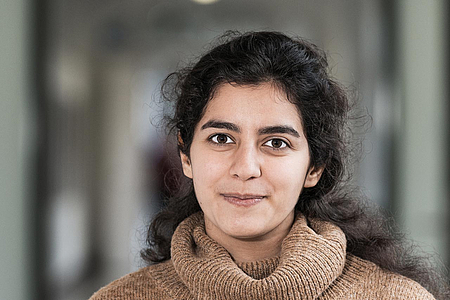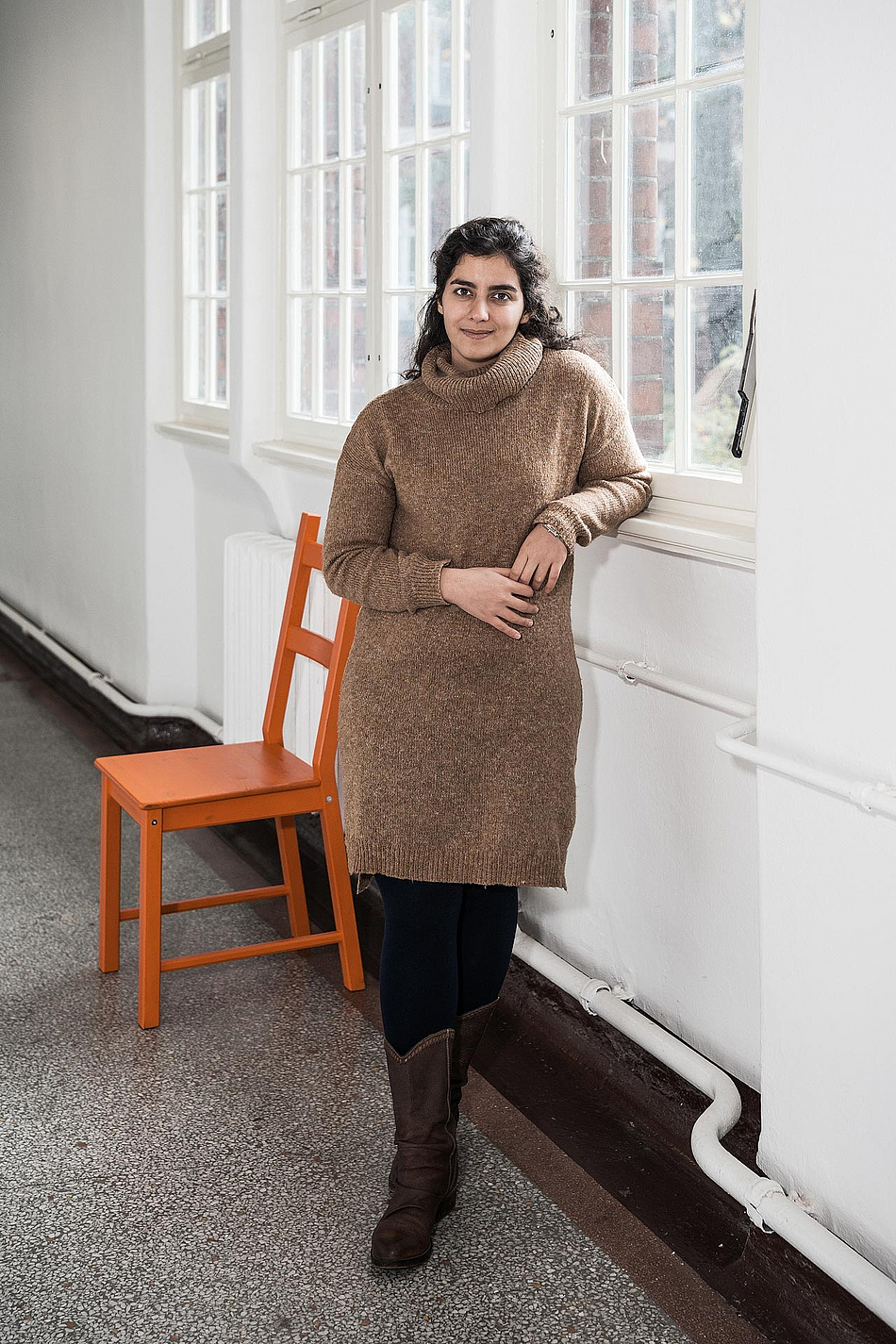A scholarship for Germany
Samaa Hijazi grew up as a Jordanian in Damascus. However, when the Syrian revolution developed into a civil war, the life of the young medical student became ever more difficult. An odyssey thus began which, despite many obstacles, finally brought her to Germany and her medical studies at the Charité. The Deutschlandstipendium scholarship holder told us how she managed to fulfil this dream.
As chance would have it, I graduated from school at the same time as the revolution in Syria began. At that time, everyday life already became noticeably more complicated. My mother is Syrian and my father is Jordanian. As I have his nationality, according to a new law I would have had to pay a lot of money for my studies. However, I received a grant thanks to my grades and was able to study medicine. However, the sum was already reduced from the second year onwards and my family had to provide the rest of the money. At the time, a kind of German fever broke out in Syria and many students had their papers translated into German. At first, I didn’t allow myself to be influenced by it, but the situation became increasingly serious. At first, only my brother had to show his pass at checkpoints, but then I had to as well. We were repeatedly threatened by soldiers. It became more and more difficult for my family to pay 5,000 euros a year for my studies. So I took my courage in both hands and set off for Jordan; two weeks later, the route was no longer passable.
“I studied German like crazy”
It was an incredible adventure. I lived with friends and studied German like crazy. Due to rumors that were circulating in Syria, I registered for an intensive course at the Goethe Institute. The rumor said that every medical student would get 2,500 euros every month from the eighth semester onwards. Or that you’d get a grant for studying in Germany if you passed three courses with the top grade. We were so hopeless that we believed everything. After the course, I asked whether that was true – and of course, it wasn’t. To study in Germany, you needed B2-level German, which would have meant five more courses. However, in Jordan my life became more complicated than I‘d expected, which is why I wanted to complete everything as quickly as possible and instead studied at home. One month later, I was at a meeting to prepare for the B1 examination at the Goethe Institute. The lady in charge remembered me and asked me with amazement: “You’re taking the exam?”

Funding program
Deutschlandstipendium
Funding period
2014 – 2017
Institution
Charité – Universitätsmedizin Berlin
2016 and 2017
Launch of her project „Tuition fees for children in Syria“ and publication of her book „Ich komme aus Syrien: Leben zwischen Orient und Okzident“
2014
Relocation to Germany and enrollment for a medical degree at Charité – Universitätsmedizin Berlin
2011
High school diploma in Syria as the revolution started
After I passed it without any problem, she was more friendly towards me. That certainly made it easier for me to actually get a grant. However, it is incredibly difficult to get a student visa. You either have to find a German guarantor or transfer a lot of money into a German account.
“Sometimes I’m sitting in a seminar and I know that my city is being attacked at that very moment”
I received a grant for a one-month language course in Mannheim. There, I did everything I could to stay in Germany. It didn’t work out, however, so I gave up hope and returned to Syria. During my first seminar back, everyone looked at me as if I was a ghost. They thought I was crazy: “You were in Germany and now you’re back here?” After six months, I received an e-mail from the German Embassy. I was asked to come to Jordan to find out whether my visa application had been approved. I let my parents decide whether I should go. Of course, they wanted me to stay but it was dangerous in Syria and they didn’t want to stand in the way of my dream – I’m very grateful to them for that. At the Embassy, I finally got the visa and was able to move to Germany for my studies.
After that, my family was in Jordan for a while, but it was difficult for them. Now they’re back in Syria. Sometimes I‘m sitting in a seminar and I know that my city is being attacked at that very moment and that my family is fleeing. Of course, I’m trying to bring them to Germany. I’d like to apply for German citizenship, but that’s only possible after eight years or, in special cases, six years. I’d like to be German, as with German citizenship you can make more of a difference than with Jordanian citizenship. It gives you a more powerful voice and more possibilities of influencing things in the world.
“I believe everything is possible in Germany”
I never thought about politics at all in Jordan or Syria, but I do in Germany. I believe everything is possible in Germany. Later, I’d like to work as a senior physician in gynecology and also support humanitarian organizations abroad. Of course, I do hope that the war in Syria will be over by then – otherwise, I’d like to help there. I love the idea of being able to relieve people of pain. Having the feeling that I have to change the world sometimes bothers me. I feel it’s my responsibility. Then I get a bad conscience about being in Germany. My friends from Syria share lots of photos on social networks – after all, life goes on there. That makes me happy, but I still wouldn’t post anything from Germany.
The war has had a powerful impact on me. At some points, I asked myself where my strength comes from. I was the youngest in my family – the little princess, in a way. Suddenly, I had to do everything alone. I came to Germany with a suitcase that was almost as big as me. A friend wanted to help me and he couldn’t lift it – so I carried it myself. To me, the Deutschlandstipendium grant means having financial support in my everyday life. I’m also happy that it isn’t only your grades that count in getting the grant, but that they also look at the people behind them. I’ve had many difficulties on my way here, so it’s nice to get something back in return.
April 2017 / MM
